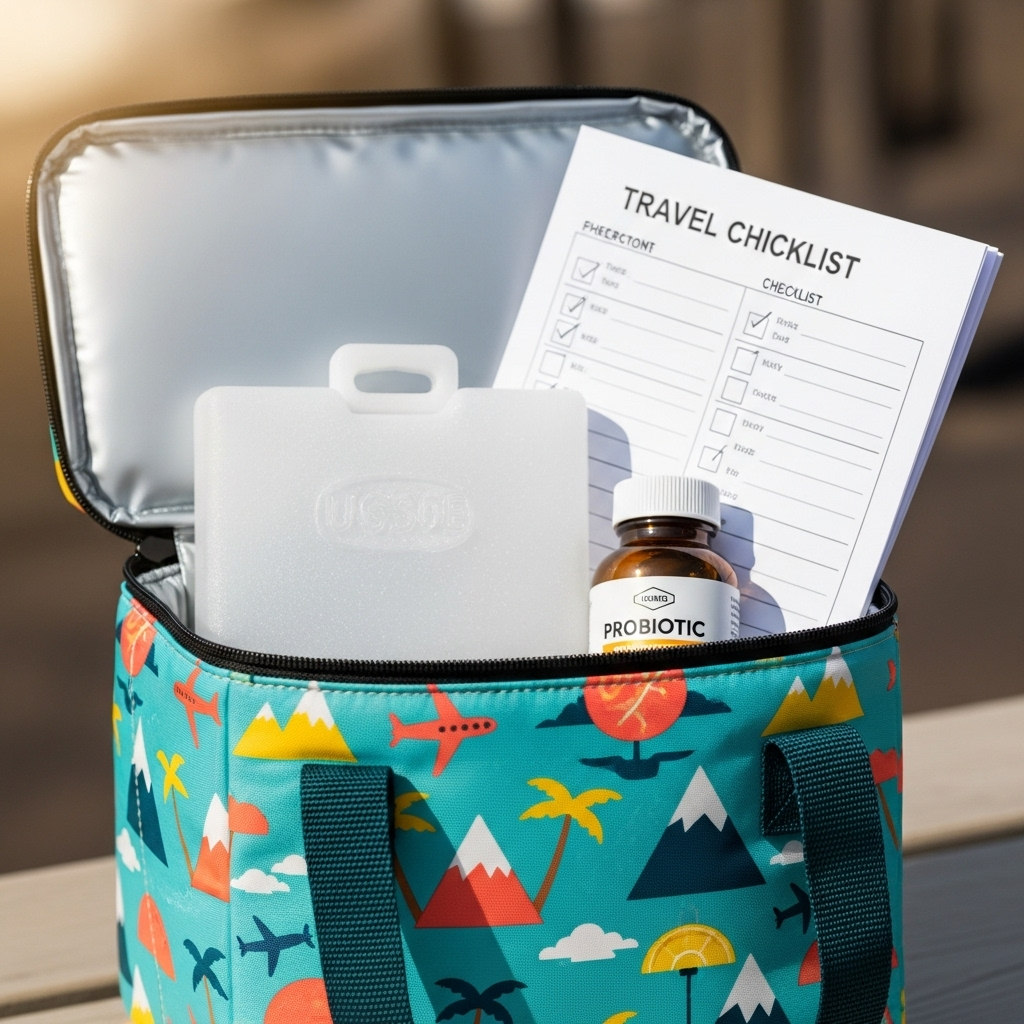Storing Pet Probiotics in Summer Travel (Heat-Safe Guide)

Traveling with pets in summer is fun but brings logistical challenges—especially when you need to keep temperature-sensitive items like probiotics effective. This guide helps pet owners plan, pack, and protect probiotic supplements during warm-weather travel so your pet receives the right dose when needed.
Why storage matters
Probiotics contain live beneficial bacteria or yeasts. Heat, humidity, and sunlight can reduce the number of viable organisms, lowering the product’s effectiveness. Some formulations are shelf-stable and tolerate room temperature, while others require refrigeration. Proper handling during travel preserves potency and reduces waste.
Know your probiotic before you go
Step one is to read the product label and manufacturer instructions carefully. Look for these key points:
- Storage requirement: “Refrigerate,” “Store in a cool, dry place,” or “Shelf-stable.”
- Formulation type: freeze-dried powder, capsules, chewables, pastes, or refrigerated liquid.
- Expiration date and lot number—pack only products that are in-date.
- Whether the product instructs reconstitution (adding water) at time of use—do not pre-mix unless advised.
Common formulations and travel implications
- Freeze-dried powders and capsules: Often more stable in short-term heat exposure but still benefit from cool storage. Many are packaged to withstand some temperature variation.
- Refrigerated liquids and some specialized strains: Typically require consistent cold (example target range on many labels: about 35–46°F / 2–8°C). These need reliable cooling during travel.
- Chewables and treats: Usually more shelf-stable but can melt, become sticky, or degrade in high heat.
- Single-dose blister packs: Convenient for travel because each dose is individually sealed, which reduces repeated heat/humidity exposure.
Prepare before travel: packing checklist
Plan and pack proactively so your probiotic stays within safe limits.
- Confirm storage instructions and expiration date.
- Choose the most travel-friendly format (single-dose blister, shelf-stable powder, or refrigerated version with cooling solution).
- Obtain a small insulated bag or portable cooler and reusable cold packs (gel packs or frozen ice packs wrapped in cloth).
- Pack in original packaging whenever possible to preserve label info and barrier properties.
- Bring a small thermometer if you must monitor temperature during longer trips.
- Keep doses you’ll need for the trip in a clearly marked container to avoid repeated handling of the bulk package.
Packing and in-transit strategies
Use these practical tips to protect probiotics from summer heat.
- Carry-on, not checked: For air travel, keep probiotics in your carry-on so they remain in a climate-controlled environment on the plane and with you between transfer points.
- Use an insulated cooler bag: Pack the probiotic in its original container inside an insulated lunch bag or soft cooler with a wrapped cold pack. Wrap the cold pack in a thin cloth so condensation doesn’t wet the product.
- Monitor travel time: Short exposures (an hour or two) to moderate temperatures are usually tolerated; prolonged exposure to high heat risks damage. For long drives, rotate cold packs or use a small powered cooler if available.
- Avoid direct sunlight and hot surfaces: Don’t leave probiotics in direct sun, on the dashboard, or on a hot seat—even if air conditioning is off intermittently.
- Do not freeze unless label permits: Freezing can damage some formulations and reduce effectiveness. Only freeze if the manufacturer explicitly says it’s safe.
- Keep moisture out: Don’t place ice directly against packaging. Excess moisture can compromise some products.
What to do if a probiotic is exposed to heat
If you suspect your probiotic has been exposed to high temperatures:
- Check the packaging: discoloration, clumping, melted chews, or unusual odors can indicate damage.
- Look at the expiration date—an expired product is more likely to be weakened by heat.
- Contact the manufacturer or your veterinarian for guidance if you’re unsure whether the product is still effective.
- When in doubt, replace the dose rather than giving a potentially ineffective or compromised product, especially for sick or immunocompromised pets.
Special cases
Puppies, kittens, senior pets, or animals with immune issues rely on consistent dosing and effective products. For these pets, err on the side of caution: choose proven, travel-friendly options and consult your veterinarian about replacements if a product is exposed to heat.
| Pros | Cons |
|---|---|
| Helps maintain gut health and routine dosing during travel | Heat can reduce potency or damage some formulations |
| Many travel-friendly formats (single-dose, shelf-stable) are available | Refrigerated products require reliable cooling |
| Simple packing solutions (insulated bag, cool packs) work well | Improper storage may lead to wasted product and avoided benefit |
FAQ
- Can heat completely ruin pet probiotics?
- Heat can reduce the number of live organisms, lowering effectiveness; severity depends on the formulation and duration of exposure. Follow product instructions and avoid prolonged high heat.
- Can I leave probiotics in the car during a stop?
- No—cars heat up rapidly in summer. Even brief stops can push temperatures high enough to degrade probiotics. Always take them with you or keep them in a cooled container.
- Is freezing okay if I have no refrigerator?
- Not usually. Freezing can damage some probiotics unless the label specifically permits freezing. Use a portable cooler with frozen gel packs instead.
- How should I carry probiotics on a flight?
- Pack them in your carry-on inside an insulated bag with wrapped cold packs. Keep the original label visible and bring any storage instructions in case airline or security personnel ask.
Key Takeaways
- Check the label—follow the manufacturer’s storage instructions first.
- Prefer carry-on and insulated coolers with wrapped cold packs for summer travel.
- Avoid direct sun, hot cars, and prolonged exposure to high heat.
- Do not freeze probiotics unless the label explicitly allows it.
- When in doubt about heat exposure or product integrity, consult the manufacturer or your veterinarian and consider replacing the dose.
Tip: Pack a small thermometer and a few extra single-dose packets if possible. That gives you peace of mind and options if temperatures spike during travel.
Disclaimer: This guide provides general information and does not replace veterinary advice. Storage requirements can vary by product and strain. Always follow product labels and consult your veterinarian or the manufacturer for specific recommendations for your pet’s probiotic supplement, especially for sick, young, elderly, or immunocompromised animals.

Leave a Reply